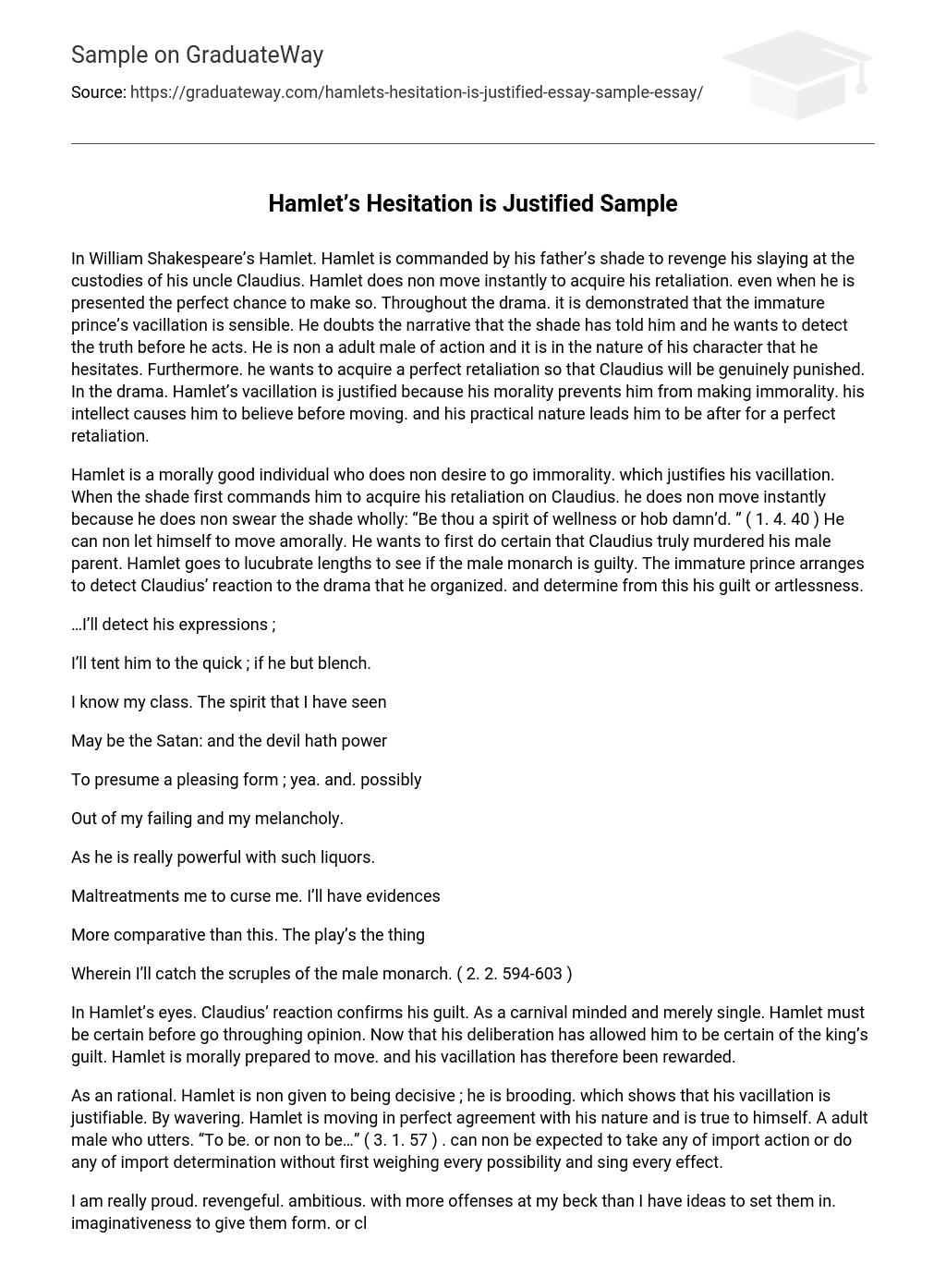In William Shakespeare’s Hamlet. Hamlet is commanded by his father’s shade to revenge his slaying at the custodies of his uncle Claudius. Hamlet does non move instantly to acquire his retaliation. even when he is presented the perfect chance to make so. Throughout the drama. it is demonstrated that the immature prince’s vacillation is sensible. He doubts the narrative that the shade has told him and he wants to detect the truth before he acts. He is non a adult male of action and it is in the nature of his character that he hesitates. Furthermore. he wants to acquire a perfect retaliation so that Claudius will be genuinely punished. In the drama. Hamlet’s vacillation is justified because his morality prevents him from making immorality. his intellect causes him to believe before moving. and his practical nature leads him to be after for a perfect retaliation.
Hamlet is a morally good individual who does non desire to go immorality. which justifies his vacillation. When the shade first commands him to acquire his retaliation on Claudius. he does non move instantly because he does non swear the shade wholly: “Be thou a spirit of wellness or hob damn’d. ” ( 1. 4. 40 ) He can non let himself to move amorally. He wants to first do certain that Claudius truly murdered his male parent. Hamlet goes to lucubrate lengths to see if the male monarch is guilty. The immature prince arranges to detect Claudius’ reaction to the drama that he organized. and determine from this his guilt or artlessness.
…I’ll detect his expressions ;
I’ll tent him to the quick ; if he but blench.
I know my class. The spirit that I have seen
May be the Satan: and the devil hath power
To presume a pleasing form ; yea. and. possibly
Out of my failing and my melancholy.
As he is really powerful with such liquors.
Maltreatments me to curse me. I’ll have evidences
More comparative than this. The play’s the thing
Wherein I’ll catch the scruples of the male monarch. ( 2. 2. 594-603 )
In Hamlet’s eyes. Claudius’ reaction confirms his guilt. As a carnival minded and merely single. Hamlet must be certain before go throughing opinion. Now that his deliberation has allowed him to be certain of the king’s guilt. Hamlet is morally prepared to move. and his vacillation has therefore been rewarded.
As an rational. Hamlet is non given to being decisive ; he is brooding. which shows that his vacillation is justifiable. By wavering. Hamlet is moving in perfect agreement with his nature and is true to himself. A adult male who utters. “To be. or non to be…” ( 3. 1. 57 ) . can non be expected to take any of import action or do any of import determination without first weighing every possibility and sing every effect.
I am really proud. revengeful. ambitious. with more offenses at my beck than I have ideas to set them in. imaginativeness to give them form. or clip to move them in. ( 3. 1. 124-127 )
Hamlet gives a batch of ideas to his actions. and it is consistent with his character. When Hamlet kills Polonius. it happens in a minute of passion. and it is self-generated. He usually has to believe everything through before he acts. It is his character and he should non be blamed for wavering. Hamlet’s intellect pushes him to be a thoughtful individual and therefore. his vacillation is excusable.
Hamlet’s ideas are practical and he desires a perfect retaliation. which rationalizes his vacillation. In one critical episode. where Hamlet is detecting the male monarch at supplication. Hamlet’s practical nature is shown. Hamlet does non desire to kill Claudius at supplication because if he does. he will direct him straight to heaven. This is a destiny that Claudius had non permitted King Hamlet. Hamlet decides to wait until Claudius is transgressing.
When he is intoxicated asleep. or in his fury.
Or in the incestuous pleasance of his bed.
At bet oning. cursing. or about some act
That has no gusto of redemption in’t:
Then trip him. that his heels may kick at Eden
And that his psyche may be as damn’d and black
As snake pit. whereto it goes. ( 3. 3. 90-96 )
Hamlet’s practical head in action forces him to waver even though he is presented the perfect chance to acquire his retaliation. He wants Claudius to be punished distressingly. and this would be a better and more complete retaliation.
In the drama. Hamlet’s vacillation is justified because his morality prevents him from making immorality. his intellect causes him to believe before moving. and his practical nature leads him to be after for a perfect retaliation. He is really moral and he does non desire to go evil. He wants to be certain that Claudius truly murdered his male parent before he kills him. Furthermore. the kernel of his character delays him in taking actions. He is brooding and his vacillation is consistent with his character. Furthermore. Hamlet desires for a perfect retaliation that could penalize Claudius wholly. When the male monarch is praying. Hamlet hesitates to kill him because he does non desire to direct him to heaven. Throughout Hamlet. the magnitude of the immature prince’s practical. rational. and moral nature is revealed and hence. it is proven that Hamlet’s vacillation is just and justified.
Bibliography
Shakespeare. William. Hamlet. Canada: Harcout Brace Jovanovich Canada Inc. . 1988.





